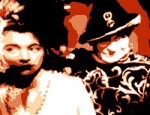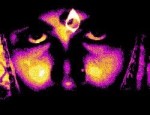Biography: life and films
René Navarre was a French actor. He was born in Limoges, Haute-Vienne, France on 8th July 1877 and died in Azay-sur-Cher, Indre-et-Loire, France on 8th February 1968, aged 90.His best films as an actor include Louis Feuillade's crime-thriller Fantômas - À l'ombre de la guillotine (1913), Juve contre Fantômas (1913), Le Mort qui tue (1913), Fantômas contre Fantômas (1914) and Jean Kemm's Vidocq (1923), and whose best work as a film director include Le Document secret (1918), Le sept de trèfle (1921) and L'homme aux trois masques (1922).
René Navarre appeared in 111 films and directed 6 films.
He has most frequently worked with the following directors: Louis Feuillade (69 films), Gaston Ravel (5), Léonce Perret (3), Pierre Caron (2), Henri Desfontaines (2), Georges-André Lacroix (2) and Émile Keppens (2).
His most frequent genres include: drama (47 films), crime-thriller (5), comedy (5), Thriller (5) and comedy-drama (2).
Our average rating for René Navarre over all films is: 2.2
Filmography
Le Trust, ou les batailles de l'argent (1911) [a]
Quand les feuilles tombent (1911) [a]
Le Proscrit (1912) [a]
Fantômas - À l'ombre de la guillotine (1913) [a]
Juve contre Fantômas (1913) [a]
La Gardienne du feu - I - La Salomé de Régis Méral (1913) [a]
La Marche des rois (1913) [a]
Le Secret du forçat (1913) [a]
Fantômas contre Fantômas (1914) [a]
L'Enfant de la roulotte (1914) [a]
L'Épreuve (1914) [a]
La Petite Andalouse (1914) [a]
L'Homme qui revient de loin (1917) [a]
La Nouvelle aurore (1919) [a]
Tue-la-mort (1920) [a,d]
L'Aiglonne (1921) [d]
La Reine Lumière (1921) [d]
Le Sept de trèfle (1921) [d]
L'Homme aux trois masques (1922) [d]
Ferragus (1923) [a]
Vidocq (1923) [a]
La Réponse du destin (1924) [a]
Le Gardien du feu (1924) [a]
Jean Chouan (1925) [a]
La Justicière (1925) [a]
Mon oncle (1925) [a]
Belphégor (1927) [a]
Poker d'as (1927) [a]
Der Weg durch die Nacht (1929) [a]
Die Schleiertänzerin (1929) [a]
El león de Sierra Morena (1929) [a]
Meineid - Ein Paragraph, der Menschen tötet (1929) [a]
Méphisto (1930) [a]
Judex 34 (1934) [a]
Le Prince Jean (1934) [a]
Mam'zelle Spahi (1934) [a]
Le Train d'amour (1935) [a]
Arsène Lupin détective (1937) [a]
La Belle revanche (1938) [a]
Monsieur Coccinelle (1938) [a]
Son oncle de Normandie (1938) [a]
Bécassine (1940) [a]
Brazza ou l'épopée du Congo (1940) [a]


